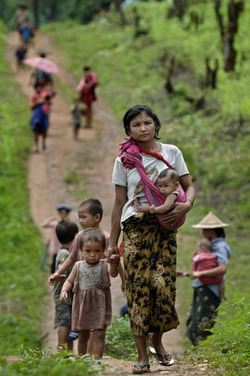Agence France-Presse | 5 March 2013
Land grabs have intensified in eastern Myanmar after a ceasefire between Karen ethnic minority rebels and the army paved the way for developers to enter the resource-rich area, rights groups said Tuesday.
Villagers have been forced from land with little or no compensation, harassed and extorted by both sides as land is parcelled off to domestic and foreign firms including from China and Thailand, the Karen Human Rights Group alleged.
"The absence of conflict has enabled many business actors to look for opportunity in previously inaccessible areas," said Khu Khu Jun of the KHRG, which interviewed hundreds of people for the study published in Bangkok.
"There has been no code of conduct (for business), legal accountability or rule of law in these areas," since the January 2012 ceasefire which raised hopes of a permanent end to one of the world's oldest civil conflicts.
Karen rebels have battled the government since 1949 in the eastern jungle near the Thai border, with villagers suffering widespread land seizures and human rights violations by both sides.
Disputes over land ownership have emerged as one of the thorniest and most volatile issues to face the reformist government of President Thein Sein.
The KHRG report, based on interviews in Karen districts between January 2011 and the end of 2012, catalogues a litany of land grabs -- for dams, plantations and logging projects -- with villagers often given no warning or information on the sale of land they have been working for decades.
The allegations could not be independently verified.
The group accuses military forces from the government and Karen rebels of ignoring customary land rights, seizing unoccupied land, providing security for developers and extorting illegal taxes.
"Development is not inherently negative... but it has caused serious problems," said Saw Albert of the KHRG, urging foreign investors to respect local land rights and carry out extensive "due diligence" on the impact of their projects.
Debbie Stothard of pro-democracy group Altsean-Burma said the land grab issue undercuts government reforms and highlights Myanmar's glaring lack "of the rule of law".
"Many Karen people continue to face a battle although 'war' is technically over," she said, warning that the government "is setting the scene for more instability" in areas where agriculture provides the only livelihood.
Land grabs have intensified in eastern Myanmar after a ceasefire between Karen ethnic minority rebels and the army paved the way for developers to enter the resource-rich area, rights groups said Tuesday.
Villagers have been forced from land with little or no compensation, harassed and extorted by both sides as land is parcelled off to domestic and foreign firms including from China and Thailand, the Karen Human Rights Group alleged.
"The absence of conflict has enabled many business actors to look for opportunity in previously inaccessible areas," said Khu Khu Jun of the KHRG, which interviewed hundreds of people for the study published in Bangkok.
"There has been no code of conduct (for business), legal accountability or rule of law in these areas," since the January 2012 ceasefire which raised hopes of a permanent end to one of the world's oldest civil conflicts.
Karen rebels have battled the government since 1949 in the eastern jungle near the Thai border, with villagers suffering widespread land seizures and human rights violations by both sides.
Disputes over land ownership have emerged as one of the thorniest and most volatile issues to face the reformist government of President Thein Sein.
The KHRG report, based on interviews in Karen districts between January 2011 and the end of 2012, catalogues a litany of land grabs -- for dams, plantations and logging projects -- with villagers often given no warning or information on the sale of land they have been working for decades.
The allegations could not be independently verified.
The group accuses military forces from the government and Karen rebels of ignoring customary land rights, seizing unoccupied land, providing security for developers and extorting illegal taxes.
"Development is not inherently negative... but it has caused serious problems," said Saw Albert of the KHRG, urging foreign investors to respect local land rights and carry out extensive "due diligence" on the impact of their projects.
Debbie Stothard of pro-democracy group Altsean-Burma said the land grab issue undercuts government reforms and highlights Myanmar's glaring lack "of the rule of law".
"Many Karen people continue to face a battle although 'war' is technically over," she said, warning that the government "is setting the scene for more instability" in areas where agriculture provides the only livelihood.












